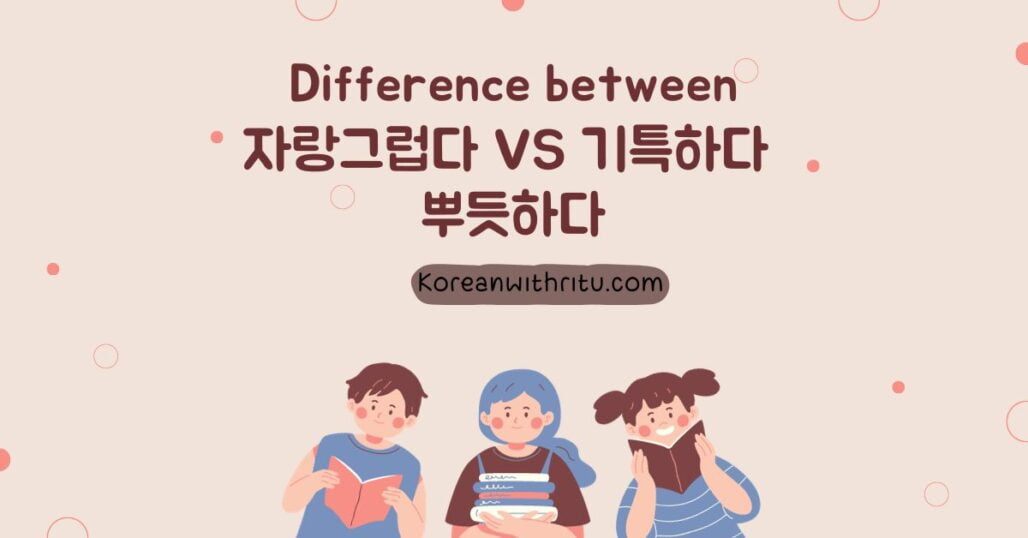The main differences between 자랑스럽다, 기특하다 and 뿌듯하다 :
The Korean words 자랑스럽다, 기특하다, and 뿌듯하다 are all related to feelings of pride or a sense of accomplishment, but they have slightly different nuances. Let’s learn about them today.
Here are the differences along with examples for each in a form of table:
| Differences | 자랑스럽다(Jarangseureopda) | 기특하다(Giteukhada) | 뿌듯하다 (Ppudeuthada) |
|---|---|---|---|
| Usage | 자랑스럽다 is used to express a sense of pride and happiness in someone else‘s accomplishments or qualities. | 기특하다 is used to express a sense of pride in someone’s noble, virtuous, or admirable actions. It conveys a feeling of respect and admiration for someone’s good deeds or honorable behavior. | 뿌듯하다 is a colloquial expression used to describe the feeling of pride and satisfaction that arises when you achieve something or when someone close to you accomplishes something meaningful. |
| To Whom | Usually used to show pride towards other people Both 자랑스럽다 and 뿌듯하다 mean “to be proud” but 자랑스럽다 is normally about people, it often involves feeling proud of someone close to you, such as a family member, friend, or someone you have a close connection with. | It’s used to show adoration and admiration for younger people, child, pets, things etc for being cute or smart and executing good behavior. | 뿌듯하다 is usually used to express “being proud” about things you’ve done yourself. |
| Emphasis | 자랑스럽다 centers around feeling proud of someone close to you and their accomplishments. | 기특하다 emphasizes admiration for virtuous and noble actions of a person. | 뿌듯하다 focuses on personal achievements and excitement. |
| Example | 내 아들이 대학에 합격해서 너무 자랑스럽다. (Nae adeuri daehag-e hapkyeokhaeseo neomu jarangseureopda.) (I am so proud because my son got accepted to college.) | 그녀는 어려운 환경에서 자라내서 높은 목표를 세우고 이루어내서 기특하다. (Geunyeo-neun eoryeoun hwangyeong-eseo jaranaeseo nopeun mokpyo-reul seugo iru-eonaeseo giteuk-hada.) (She is admirable because she grew up in a difficult environment, set high goals for herself, and achieved them.) | 내가 시험에서 1등을 한 걸 보니까 뿌듯해. (Nae-ga siheom-eseo il-deung-eul han geol bonikka ppudeut-hae.) (I feel proud because I got first place in the exam.) |
자랑스럽다
자랑스럽다 is used to express a sense of pride and happiness in someone else‘s accomplishments or qualities. It is usually used to show pride towards other people Both 자랑스럽다 and 뿌듯하다 mean “to be proud” but 자랑스럽다 is normally about people, it often involves feeling proud of someone close to you, such as a family member, friend, or someone you have a close connection with. 자랑스럽다 centers around feeling proud of someone close to you and their accomplishments.
For example: 내 아들이 대학에 합격해서 너무 자랑스럽다. (Nae adeuri daehag-e hapkyeokhaeseo neomu jarangseureopda.)
/I am so proud because my son got accepted to college./
기특하다
On the other hand, 기특하다 is used to express a sense of pride in someone’s noble, virtuous, or admirable actions. It conveys a feeling of respect and admiration for someone’s good deeds or honorable behavior. It’s used to show adoration and admiration for younger people, child, pets, things etc for being cute or smart and executing good behavior. 기특하다 emphasizes admiration for virtuous and noble actions of a person.
For Example: 그녀는 어려운 환경에서 자라내서 높은 목표를 세우고 이루어내서 기특하다. (Geunyeo-neun eoryeoun hwangyeong-eseo jaranaeseo nopeun mokpyo-reul seugo iru-eonaeseo giteuk-hada.)
/She is admirable. Despite growing up in a difficult environment, she set big goals for herself, and achieved them./
뿌듯하다
뿌듯하다 is a colloquial expression used to describe the feeling of pride and satisfaction that arises when you achieve something or when someone close to you accomplishes something meaningful. It’s usually used to express “being proud” about things you’ve done yourself. 뿌듯하다 focuses on personal achievements and excitement.
For example: 내가 시험에서 1등을 한 걸 보니까 뿌듯해. (Nae-ga siheom-eseo il-deung-eul han geol bonikka ppudeut-hae.)
/I feel proud because I got first place in the exam./
Conclusion:
뿌듯하다 focuses on personal achievements and excitement, 기특하다 emphasizes admiration for virtuous actions, and 자랑스럽다 centers around feeling proud of someone close to you and their accomplishments.
Hope you find this helpful 🙂



